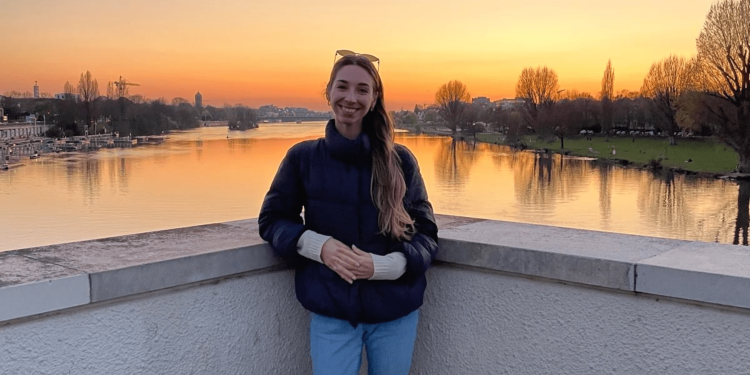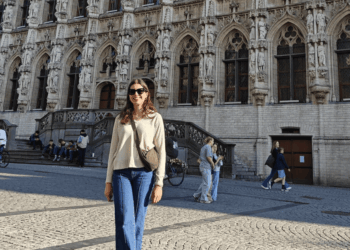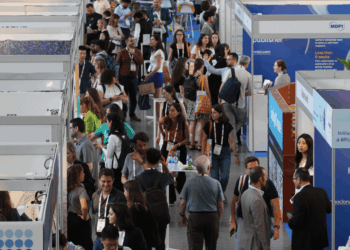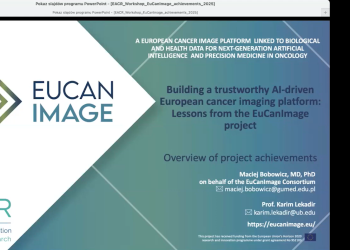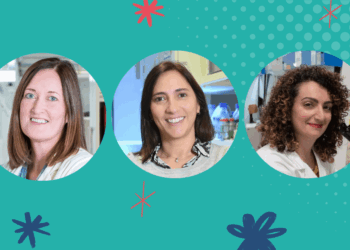 EACR member Katie Begg has now completed her EACR-Molecular Oncology Editorial Fellowship, funding that is awarded to enable a talented cancer researcher to gain knowledge and experience of scientific publishing through a 3-month placement with our affiliated journal Molecular Oncology.
EACR member Katie Begg has now completed her EACR-Molecular Oncology Editorial Fellowship, funding that is awarded to enable a talented cancer researcher to gain knowledge and experience of scientific publishing through a 3-month placement with our affiliated journal Molecular Oncology.
Katie is a postdoctoral fellow in Jessica Downs’ lab at the Institute of Cancer Research in London, UK and completed her fellowship at the Molecular Oncology Editorial Office in Heidelberg, Germany between 03 February and 02 May 2025. We recently caught up with her to hear about her experience.
Why did you decide to apply for an EACR-Molecular Oncology Editorial Fellowship?
About a year ago, I was at a conference presenting my work, still unsure what I wanted to do after my postdoc. My goal for that conference was to get feedback and make connections in case I wanted to do another postdoc. Instead, I met an Editor! She told me about her job, starting the day reading new submissions and going through the literature, going to conferences and interacting with the scientific community. It all just clicked – it seemed like the perfect combination of the aspects I love about being a researcher (the science, conferences, building knowledge and learning how to use it), and the things I felt like I was missing (I knew I wanted to study broader rather than specialising, and to use my communication skills more day to day).
So, when I heard about the EACR-Molecular Oncology Editorial Fellowship late in 2024 it seemed like an unmissable opportunity, to figure out if editing was really for me and gain some experience too. It’s rare you get the opportunity to do something outside of the lab as a postdoc, so I jumped at the chance!

Can you summarise what you learned during your editorial fellowship?
The team were really flexible and gave me different projects to choose from so I could try my hand at different types of tasks. I discovered that I really enjoyed the day-to-day editorial tasks, particularly the “first looks”. This is where a paper is checked over to make sure they have the right format, proper ethics statements, the figures and legends are in good shape and that it’s easy to follow. So, I learnt both how to see the paper as a whole, how it fits in the field, and whether it has met the high publishing standards. These tasks, along with finding appropriate reviewers for the peer review of new manuscripts, are like the “bread and butter” of editorial jobs.
I also read articles due to be published in upcoming issues and wrote summaries, which was great to learn how to quickly digest research, something editors do frequently. I discussed and planned some commissioning work for reviews and commentaries, thinking about what topics could be represented more and what direction cancer research was going in. And I also sat in on meetings discussing manuscript status and image integrity and analysed social media data to measure journal performance.
Describe a ‘typical day’ of your editorial fellowship.
I was conducting my postdoctoral work alongside the fellowship, so my days were quite busy, but I’m really grateful that the team were so accommodating! The first few weeks involved training: I’d have regular meetings with each of the editors, practice what they’d taught me and check in with them later. At Molecular Oncology everything is managed in an online system. So, once I’d got the hang of things, I’d start by logging in here and seeing what tasks needed doing and catch up with the editors on Teams too. There were a few long-term tasks that I would work on a bit every day, and shorter-term ones that I’d work on in between experiments. Mol Onc, and the FEBS teams, also had Friday morning virtual coffee meetings, which were a lovely opportunity to catch up!
During my time in Heidelberg, my days were similar but with the added benefit of being in the same place as editors Yeliz (the previous fellowship winner!) now working as an Editor at MolOnc and Ruzhica the managing editor of the journal, so we had more discussions about the manuscripts and my work, and I saw a lot more of what they do day-to-day. I went with them to the EBML to attend a symposium, which was interesting attending a conference through an editor’s lens. We also had some great chats about editing and academia and lots of nice coffee!

Did you take part in any interesting local activities during your visit to the Molecular Oncology Editorial Office in Heidelberg?
It’s a beautiful city and has one of the oldest universities in Europe! So particularly in the old town, I found it fascinating just to walk around and be in a place with such a rich history. The surrounding area also has some beautiful scenery, so I made sure to do lots of hiking. I also loved the Flamkuchen (which is like very thin German pizza), and my morning runs along the Neckar River!
What was a personal highlight of your fellowship?
There are so many to choose from! Of course, being in Heidelberg was amazing. But probably my highlight, was commissioning a commentary for the journal. This was great as I got a real taste of what it’s like to be an editor, to read the literature, find papers you think are worthy of highlighting to the community and to engage with other researchers. Dr Eileen Parkes and her team wrote a great piece, which is available to read on the Molecular Oncology website.
Did you have a personal mentor or anyone who particularly helped you?
The editorial staff Ruzhica, Yeliz, Ioannis and Irene all taught me different aspects of editing and were all so nice and patient with me as I was learning!
How has this fellowship been beneficial to your research and/or your career?
It’s so hard to know what a job is going to be like before you’re in it, and making the move away from the lab is always going to be difficult. I am so grateful that I had this experience, because it showed me that there is something else out there that can be just as rewarding as research and solidified for me that editing was where I wanted to go. It gave me a unique insight into the publishing industry, and as I was learning from the editors at Molecular Oncology, it showed me which of my own skills I need to develop. As I’m finishing up my postdoc, it also gave me real understanding of what I need to do when I submit my own papers, how to ensure the paper is successful and how to make the editor’s job a little easier!

Do you intend to pursue a career in scientific publishing?
Yes. Since returning from my fellowship, I’ve started applying for jobs in editing. I can’t wait to get going!
Is there anything else you’d like to mention?
One extra thing the fellowship gave me was a huge respect for editors. They work very hard and are all super knowledgeable. On top of this, they do genuinely care about getting papers published to as good a standard as possible. The second thing is just a note of encouragement to people reading who think they might be interested in trying something different. Particularly for the ECRs, keep your eye out for opportunities and go for it! You never know what might happen, and taking proactive steps in your career is always a good thing.
EACR-Molecular Oncology Editorial Fellowship
To find out more about this opportunity, click here.


